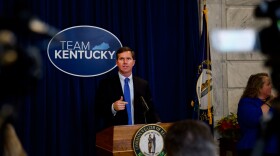The Kentucky Derby will be postponed for the second time in its 146-year history.
The race and its affiliated events arethe major economic driver for the Louisville area’s economy, and equally important to the region culturally. Officialsannounced Tuesday it would be pushed back to September 5, making it the latest major sporting event changed by the coronavirus pandemic.
Public health experts are encouraging everyone to stay away from crowds to avoid spreading the disease.
Churchill Downs CEO Bill Carstanjen said television partner NBC was a part of the decision. They chose the date in hopes that the pandemic will have slowed enough to allow in-person spectators by early September.
“We also feel confident that we are going to run the Kentucky Derby and we are going to run it with a crowd,” Carstanjen said on a call with reporters Tuesday. “The Kentucky Derby is a participatory event. Its energy and its magic really come from everybody participating and being there to enjoy it.”
The historic race’s first postponement was in 1945, at the end of World War II. It is traditionally run on the first Saturday in May at Churchill Downs.
State and local officials praised the decision.
In his daily press conference, Gov. Andy Beshear called it the right decision and a “great” one, even as he acknowledged that delaying Derby would hurt economically. He said the pandemic is causing widespread economic pain already. Earlier in the conference, he announced that many non-essential “public-facing businesses” must close by 5 p.m. Wednesday.
Mayor Greg Fischer also said he supported the move. In a video message released on social media, he said fighting back the coronavirus is the challenge Louisville has to face before Derby can go on.
“The people of the world, the people of America, the people of Louisville, Kentucky, are coming together to fight this virus, so I applaud Churchill Downs for moving the Kentucky Derby to Labor Day Weekend,” he said.
Last week, Fischer ordered that aslew of events through early April be canceled or postponed, including the Kentucky Derby Festival’s Fillies Derby Ball. That move seemed to spare Thunder Over Louisville, scheduled for April 18. The massive fireworks show was projected to draw 725,000 attendees. But on Tuesday, the Kentucky Derby Festival announced all events would be moved, and the new date for Thunder is August 15.
But on Sunday the Centers for Disease Control and Prevention recommended that people stay away from gatherings of 50 or more people for the next eight weeks. That time period would have covered the Derby, and all the events leading up to it. And on Monday, President Donald Trump issuednew short-term guidelines, including avoiding groups of more than 10 people and canceling discretionary travel.
Such recommendations, if applied to Derby and its surrounding events, would make attendance a public health threat.
Silver Lining?
Derby, Thunder and other Derby season events have an estimated $400 million economic impact on the Louisville region.
Mary Ellen Wiederwohl, Louisville’s economic development chief, acknowledged that impact in an emailed statement. She described Derby season as crucial for sustaining local businesses.
“It is an opportunity for us to showcase our city at its finest,” she said. “We will work with tourism and business partners to understand the impacts and implications of postponing the Kentucky Derby.”
Moving Derby to early September could have a silver lining for Louisville, said Karen Williams, the president and CEO of Louisville Tourism.
She said there are 27,000 workers in Louisville who rely on tourism for their jobs. And since September is usually a light month for tourists, rescheduling the Derby could provide a boost at that time, she said.
“This news bodes well for increased revenues during that time,” she said in an emailed statement.
As for workers at the Churchill Downs racetrack, spokeswoman Tonya Abeln said it will be business as usual for those who are full-time leading up to the postponed event. The delay will, however, change when the track hires seasonal workers.
This story has been updated.






